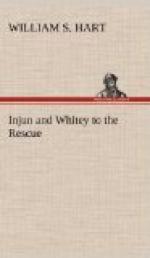Dan
And the other, Buck’s:
Dont kill this kid but come as near to it as you kin.
Walt
A great light broke in on Whitey. So this was the meaning of it all? the twenty-five mile walk to Cal Smith’s house; the singular conduct of the men at the T Up and Down; the nester’s lending him that jack Felix, that he knew would run home and leave Whitey alone on the plains; and Walt Lampson’s sending him out on the range, in the face of a storm. And as a sort of high peak in his mountain range of troubles Whitey remembered Little Thompson’s talk about funerals. Whitey buried his head in his hands and groaned at the thought. He had dreamed of funerals ever since. He determined to make a will and put in it that Little Thompson should not be allowed to come to his (Whitey’s) funeral.
They had passed him along from one to another, making a fool of him, and laughing behind his back all the time. He knew how rough cowmen often were in their fun, and the only wonder was that they hadn’t treated him worse. He supposed that they would have done so had his father not been a ranch-owner. So! they probably thought he was something of a molly-coddle. He was angry enough, but this thought made him angrier—that he hadn’t been treated worse. Which goes to show what a reasonable thing anger is!
Whitey went out, sat down behind the cook’s shack, and gave way to gloomy reflections. He reviewed his past life for quite a way back, and everything in it seemed to be wrong. He wanted to do big things, and he always was just missing them. If he had been earlier when he followed those train robbers, he might have warned the people on the train, and been a sort of hero. If, if, if—oh, what was the use?
But it certainly is bitter to think you might make yourself a hero, and find that some one else has made a fool of you. Whitey remembered a saying that the first time a fellow is fooled it is the other fellow’s fault—and the next time it is his own. They wouldn’t fool him again. He’d do something big yet. He’d show them!
The first thing to do was to find Injun. The next thing to do was to leave that Star Circle Ranch. Whitey hated it there, anyway. And the next was a thing not to do—not to go back to the Bar O, and have Bill Jordan and the others laugh at him. The first thing proved easy, and Whitey proceeded to tell Injun his troubles.
“Huh,” said Injun. “Better’n him school.”
“I know it’s better than school,” said Whitey, annoyed, as we always are when we seek sympathy and get facts. “I’d rather do ’most anything than go to that awful school. But what I object to is being made a fool of.” He was suffering from mortification, which is a sort of ingrowing anger, and the more it sunk in, the angrier he got.




